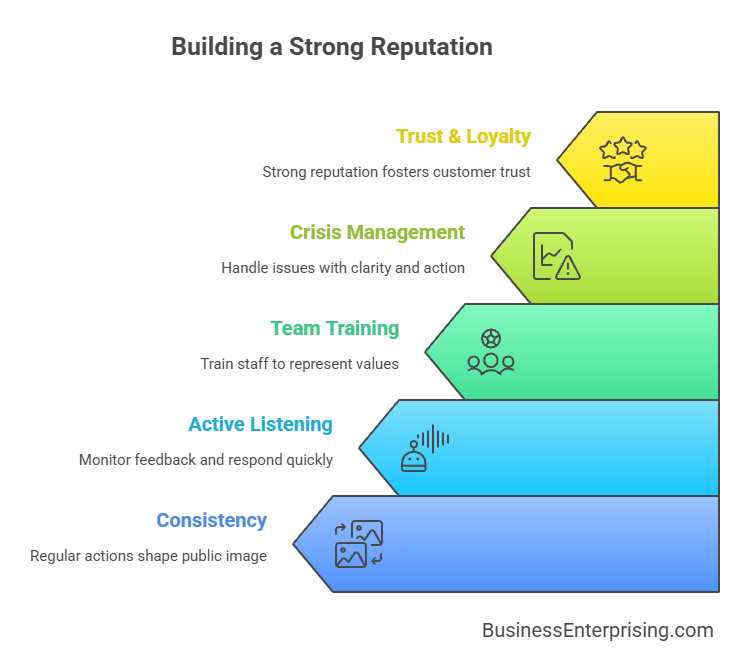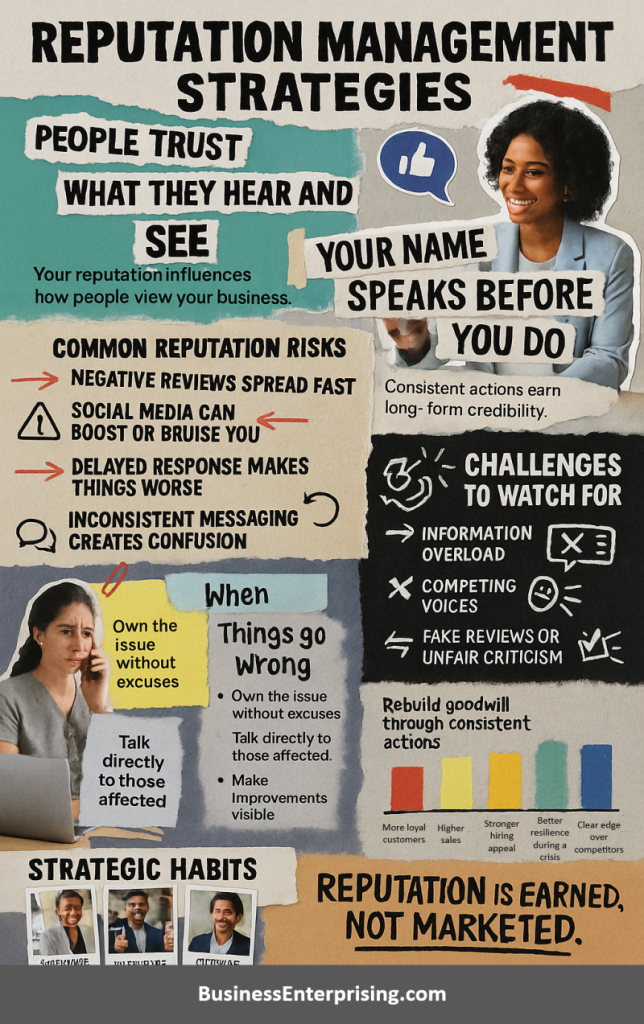 Your reputation influences every part of your business. People often decide to trust you based on what they hear and see. Therefore, strong reputation management strategies help you stay ahead of problems and build long-term credibility. You need a clear approach that covers both prevention and response.
Your reputation influences every part of your business. People often decide to trust you based on what they hear and see. Therefore, strong reputation management strategies help you stay ahead of problems and build long-term credibility. You need a clear approach that covers both prevention and response.
Additionally, reputation affects more than customer opinions. It shapes how vendors, partners, and future hires view your business. However, many companies wait until something goes wrong before taking it seriously. That delay makes recovery harder and more expensive. Therefore, focus on consistency now rather than damage control later.
You already have the tools to protect your name. The key is using them regularly and with intention. Monitor what people say, respond when needed, and keep your promises. Additionally, train your team to represent your values through their daily work. These simple habits make a strong impression over time.
Every brand has weak spots. The difference lies in how you manage them. Therefore, take time to review your systems and messages before they become public problems. Additionally, stay calm when criticism appears. Most people care more about how you respond than why something went wrong.
Your reputation is one of your most valuable business assets. With effort and clarity, you can protect it and build trust that lasts.
The Importance of Reputation Management
Your reputation influences how people view your business before you even speak. One bad review can outweigh ten good experiences. Therefore, you must pay attention to how your business is perceived both online and offline. A strong reputation builds trust, while a damaged one pushes customers away.
Reputation management is not about avoiding criticism. It’s about responding with clarity, consistency, and action. Additionally, your response time matters. Silence often signals disinterest or guilt. However, a calm, thoughtful reply shows that you value your customers and take problems seriously. This can shift opinions more than the original issue.
Your team plays a big role in shaping your reputation. Therefore, train them to treat people with respect and follow through on commitments. Additionally, ask for feedback often. Many people will stay silent unless invited to speak. Listening gives you a chance to fix small problems before they grow.
Online reviews, social media comments, and casual mentions all shape public opinion. Therefore, monitor these sources regularly. Respond to both positive and negative input. Additionally, thank people who take time to share feedback. These habits show you care and want to improve.
Strong reputation management strategies keep your business steady through change. They build trust, improve loyalty, and attract new opportunities. Therefore, be consistent, stay visible, and take responsibility when needed. The more you invest in your reputation, the less repair work you’ll face later.
Customer Trust and Loyalty:
In essence, a strong reputation fosters trust and loyalty among customers. Consumers are more likely to do business with companies they perceive as trustworthy and reliable.
Competitive Advantage:
Undeniably, companies with a good reputation stand out in a crowded marketplace. A positive reputation can be a significant differentiator, attracting customers as well as talent.
Crisis Resilience:
Businesses with a solid reputation can also better withstand crises. In fact, trust and goodwill built over time can help a company recover more quickly from negative events.
Increased Sales and Revenue:
Additionally, positive public perception can lead to increased sales and revenue. Customers are willing to pay a premium for products and services from reputable companies.
Attracting Talent:
A strong reputation makes a company more attractive to potential employees. Talented individuals seek to work with reputable organizations, enhancing the company’s human capital.
Challenges in Reputation Management
Reputation management comes with more pressure than most business owners expect. A single comment can spread quickly and shape public opinion fast. Therefore, you must act quickly without rushing decisions. The balance between speed and care makes this work especially difficult.
Additionally, not every comment or review is fair. Some complaints may be exaggerated or entirely false. However, you still need to respond without emotion. People judge how you handle criticism more than the complaint itself. Therefore, stay calm, keep your tone professional, and focus on solutions you can offer.
The volume of online content is another challenge. New platforms, review sites, and forums pop up constantly. Therefore, staying current requires time and systems. Additionally, what you don’t know can hurt you. Missed reviews or posts can spread damage before you even notice them. Regular monitoring is essential, even when nothing seems wrong.
You also face the challenge of keeping responses consistent across your team. Therefore, everyone who speaks for your business needs guidance and boundaries. Additionally, train staff on tone, timing, and problem-solving. This helps avoid confusion or mixed messages when things go public.
Strong reputation management strategies work best when you’re proactive. That means building habits before a problem shows up. Monitor channels, review your policies, and act on feedback. With a steady approach, you reduce damage and build trust. Even when things go wrong.
Despite its importance, reputation management can be challenging due to several factors:
Social Media Dynamics:
Social media platforms amplify voices and opinions, both positive and negative. Managing the rapid spread of information requires constant vigilance.
Negative Reviews and Feedback:
Negative reviews can significantly impact public perception. Addressing and mitigating negative feedback is crucial for maintaining a positive reputation.
Transparency Expectations:
Consumers expect transparency and authenticity from businesses. Any perceived lack of honesty or ethical behavior can harm a company’s reputation.
Crisis Situations:
Crises, such as data breaches, product recalls, or executive misconduct, can severely damage a company’s reputation. Effective crisis management is essential for mitigating long-term effects.
Competitor Actions:
Competitors may engage in tactics that can negatively influence public perception. Staying ahead and maintaining a positive image requires proactive management.
Strategies for Effective Reputation Management
Reputation grows through consistency. Your daily actions, responses, and service all shape how people view your business. Therefore, every touchpoint matters. Even small moments can leave a strong impression. Over time, these moments define your public image.
Strong reputation management strategies begin with active listening. Monitor reviews, social media, and direct feedback. Additionally, respond quickly and clearly to both praise and complaints. However, avoid canned replies. People value honest answers that match the tone of the situation. This builds trust and helps you maintain control of your message.
Your team plays a large role in shaping your image. Therefore, train them to speak clearly, act respectfully, and follow through. Additionally, give them the tools they need to solve problems on the spot. The fewer delays, the more confident your customers will feel. Clear direction keeps everyone on the same page.
Consistency is also key in your content and messaging. Therefore, review your website, emails, and posts often. Make sure the tone, promises, and branding match across all channels. Additionally, use customer feedback to refine your public message. Small changes can make a big difference in how your business is perceived.
Reputation is always evolving. One strong week will not cancel out past mistakes. Therefore, stay focused on steady improvements and regular follow-up. Reputation management takes patience, discipline, and awareness. Over time, these habits will build a public image you can stand behind.
Monitor Online Presence:
Regularly monitor what is being said about your company online. Use tools like Google Alerts, Social Mention, and brand monitoring software to track mentions, reviews, as well as feedback across various platforms.
Engage with Customers:
Actively engage with customers on social media, review sites, and forums. Respond to comments, reviews, and messages promptly and professionally. Engaging with customers shows that you value their feedback and are committed to addressing their concerns.
Provide Excellent Customer Service:
Exceptional customer service is key to maintaining a positive reputation. Train employees to handle customer inquiries and complaints effectively and courteously. Resolve issues quickly and satisfactorily to build trust and loyalty.
Encourage Positive Reviews:
Encourage satisfied customers to leave positive reviews and testimonials. Highlight these reviews on your website and social media channels to showcase customer satisfaction.
Create Valuable Content:
Develop and share high-quality content that reflects your brand values and expertise. Blogs, articles, videos, and social media posts can help establish your company as a thought leader and build a positive image.
Restoring Goodwill
Rebuilding goodwill takes more than an apology. Once trust is damaged, people need to see real changes. Therefore, your response must be thoughtful and consistent. Start by owning the problem without excuses. This shows you take responsibility and value your reputation.
Additionally, communicate directly with those affected. Whether it’s one person or your full audience, people want to feel heard. However, avoid making promises you can’t keep. Focus on what you can do right now to make things better. A clear next step matters more than long explanations.
Follow-up is where many businesses fall short. Therefore, stay in touch after the issue is addressed. Ask for feedback, answer questions, and show that improvement continues. Additionally, update your internal systems to reduce repeat problems. A repeated mistake sends the message that you haven’t learned.
Restoring goodwill also means building up your positive presence again. Therefore, highlight improvements and share wins without bragging. Additionally, encourage satisfied customers to speak up. Over time, their voices help rebuild what was lost.
Goodwill can’t be rushed or bought. However, consistent action and strong communication can shift opinions. The most effective reputation management strategies involve accountability and time. Keep showing up, doing the right thing, and reinforcing trust. With patience and effort, you can rebuild your reputation from a place of honesty and care.
Maintain Transparency and Authenticity:
Be transparent and authentic in your communications. Share company news, successes, and challenges openly. Admitting mistakes and outlining steps to address them can enhance credibility.
Implement a Crisis Management Plan:
Develop a comprehensive crisis management plan to address potential reputation-damaging situations. The plan should include protocols for communication, decision-making, and corrective actions.
Showcase Corporate Social Responsibility (CSR):
Demonstrate your commitment to social responsibility by engaging in community initiatives, sustainability efforts, and ethical business practices. Publicize these efforts to build a positive brand image.
Leverage Public Relations (PR):
Utilize PR strategies to manage your company’s image and public perception. Press releases, media engagements, and sponsorships can enhance visibility and credibility.
Gather and Act on Feedback:
Regularly solicit feedback from customers, employees, and stakeholders. Use this feedback to make improvements and demonstrate your commitment to continuous enhancement.
Conclusion
Your reputation doesn’t build itself. It takes steady effort, clear actions, and ongoing attention. Each decision you make shapes how others see your business. Therefore, you must stay focused on consistency and follow-through. Your reputation can support your growth or hold it back.
Additionally, reputation is not a one-time project. You must maintain it during both quiet periods and busy times. However, many businesses only respond when there’s a problem. Waiting too long creates damage that takes more time to repair. Therefore, stay proactive and treat every interaction as part of your public image.
Mistakes happen, but silence makes them worse. When something goes wrong, speak clearly and act quickly. Additionally, follow up with real improvements. People don’t expect perfection. They expect honesty and effort. Over time, these actions earn trust and protect your name.
Strong reputation management strategies rely on habits, not hype. Train your team, monitor feedback, and take responsibility when needed. Additionally, reward the behaviors that support your brand values. These small actions shape how others describe your business when you’re not in the room.
Your reputation affects sales, hiring, and long-term success. Therefore, give it the same care as any core business function. With time, your consistency will build the kind of trust that no marketing budget can buy.


